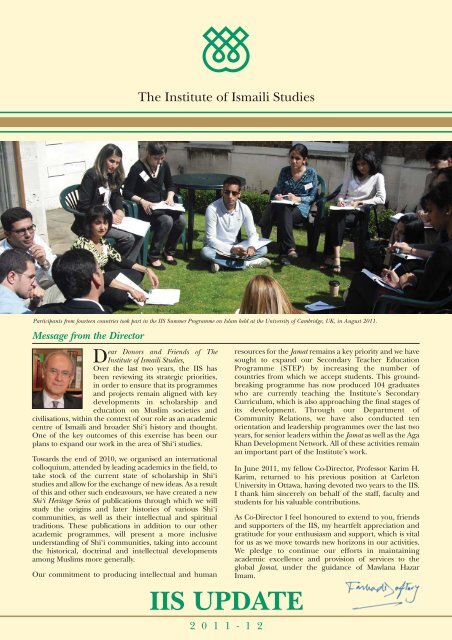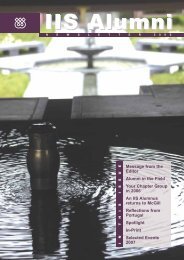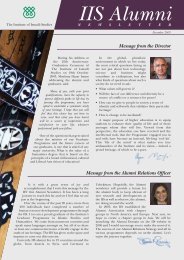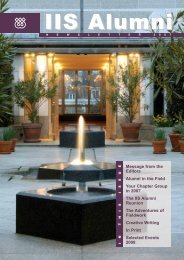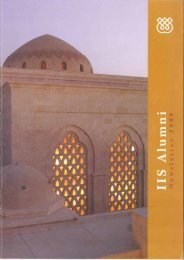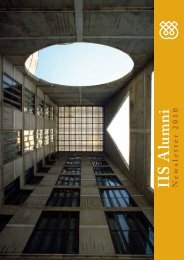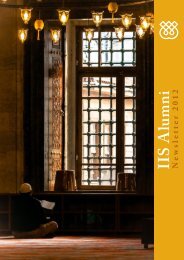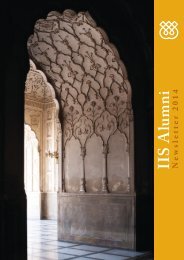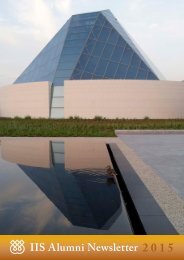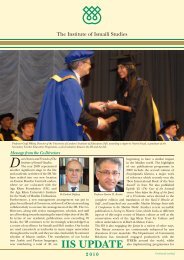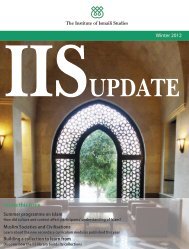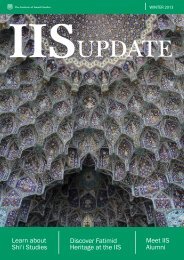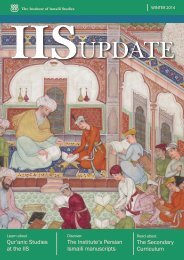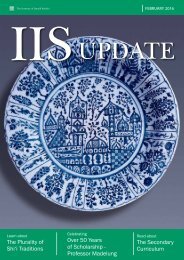iisupdate2011-12new
You also want an ePaper? Increase the reach of your titles
YUMPU automatically turns print PDFs into web optimized ePapers that Google loves.
Participants from fourteen countries took part in the IIS Summer Programme on Islam held at the University of Cambridge, UK, in August 2011.<br />
Message from the Director<br />
Dear Donors and Friends of The<br />
Institute of Ismaili Studies,<br />
Over the last two years, the IIS has<br />
been reviewing its strategic priorities,<br />
in order to ensure that its programmes<br />
and projects remain aligned with key<br />
developments in scholarship and<br />
education on Muslim societies and<br />
civilisations, within the context of our role as an academic<br />
centre of Ismaili and broader Shi‘i history and thought.<br />
One of the key outcomes of this exercise has been our<br />
plans to expand our work in the area of Shi‘i studies.<br />
Towards the end of 2010, we organised an international<br />
colloquium, attended by leading academics in the field, to<br />
take stock of the current state of scholarship in Shi‘i<br />
studies and allow for the exchange of new ideas. As a result<br />
of this and other such endeavours, we have created a new<br />
Shi‘i Heritage Series of publications through which we will<br />
study the origins and later histories of various Shi‘i<br />
communities, as well as their intellectual and spiritual<br />
traditions. These publications in addition to our other<br />
academic programmes, will present a more inclusive<br />
understanding of Shi‘i communities, taking into account<br />
the historical, doctrinal and intellectual developments<br />
among Muslims more generally.<br />
Our commitment to producing intellectual and human<br />
IIS UPDATE<br />
2 0 1 1 - 1 2<br />
resources for the Jamat remains a key priority and we have<br />
sought to expand our Secondary Teacher Education<br />
Programme (STEP) by increasing the number of<br />
countries from which we accept students. This groundbreaking<br />
programme has now produced 104 graduates<br />
who are currently teaching the Institute’s Secondary<br />
Curriculum, which is also approaching the final stages of<br />
its development. Through our Department of<br />
Community Relations, we have also conducted ten<br />
orientation and leadership programmes over the last two<br />
years, for senior leaders within the Jamat as well as the Aga<br />
Khan Development Network. All of these activities remain<br />
an important part of the Institute’s work.<br />
In June 2011, my fellow Co-Director, Professor Karim H.<br />
Karim, returned to his previous position at Carleton<br />
University in Ottawa, having devoted two years to the IIS.<br />
I thank him sincerely on behalf of the staff, faculty and<br />
students for his valuable contributions.<br />
As Co-Director I feel honoured to extend to you, friends<br />
and supporters of the IIS, my heartfelt appreciation and<br />
gratitude for your enthusiasm and support, which is vital<br />
for us as we move towards new horizons in our activities.<br />
We pledge to continue our efforts in maintaining<br />
academic excellence and provision of services to the<br />
global Jamat, under the guidance of Mawlana Hazar<br />
Imam.
Qur’anic Studies<br />
Approaches to the Qur’an in sub-Saharan Africa<br />
The Institute of Ismaili Studies sponsored a<br />
workshop entitled Approaches to the Qur’an in<br />
sub-Saharan Africa which took place in Toronto,<br />
Canada in May 2011. The workshop forms part<br />
of the Qur’anic Studies Unit’s project on Regional<br />
Approaches to the Qur’an and was the result of a<br />
collaboration with the Textile Museum of Canada and<br />
York University, Canada.<br />
Organised by Dr Zulfikar Hirji, Assistant Professor of<br />
Anthropology at York University, the workshop took<br />
place at The Textile Museum of Canada alongside their<br />
exhibition, Magic Squares: The Patterned Imagination of<br />
Muslim Africa in Contemporary Culture.<br />
Dr Zulfikar Hirji of York University introducing a panel discussion.<br />
Sheikh Abdel Kader Haidara of the organisation<br />
Sauvegarde et Valorisation des Manuscrits pour la<br />
Défense de la Culture Islamique (Preservation and<br />
Recovery of Manuscripts for the Protection of Islamic<br />
Culture) gave a public lecture as part of the proceedings<br />
on The Manuscript Library of Mamma Haidara which was<br />
established in the middle of the 19 th century in Bimba<br />
village, Mali. As one of the most prominent libraries in<br />
the region, it houses manuscripts belonging to all fields<br />
of Islamic studies from the Qur’an, hadith, jurisprudence<br />
and literature, to astrology and grammar.<br />
Sheikh Abdel Kader Haidara of the Mamma Haidara Library in Mali<br />
(second from left) with Wesley Oakes and Remi Warner of York University.<br />
The workshop took a multidisciplinary approach to the<br />
subject, gathering scholars from Islamic, African and<br />
Religious Studies as well as the fields of history,<br />
linguistics, anthropology and sociology. Discussions<br />
ranged from tafsir in multiple languages, the teaching of<br />
the Qur’an by men and women, esoteric understandings<br />
of the Qur’an, including the use of the Qur’an as a<br />
talisman, and the role of the Qur’an in contemporary<br />
popular culture.<br />
Artist Hamid Kachmar discussing his work with workshop participants.<br />
President of the Ismaili Council for Canada, Mohamed Manji,<br />
in conversation with Jamati leaders and IIS representatives.<br />
In this regard, Rahim S. Rajan, an IIS graduate, currently<br />
with the Bill & Melinda Gates Foundation’s Special<br />
Initiatives Group and Harlan Wallach Head of<br />
Northwestern University’s Advanced Media Production<br />
Studio, also gave a presentation as part of the workshop on<br />
the digitisation of manuscripts in Mali. A concert of<br />
African Muslim devotional music by the Waleed<br />
Abdulhamid Ensemble concluded the academic event.<br />
The Workshop and related events were well attended by<br />
scholars from various universities in the region, IIS alumni<br />
and members of Toronto’s diverse ethnic and religious<br />
communities.
Shi‘i Studies<br />
The Study of Shi‘i Islam<br />
In September 2010, the IIS organised an<br />
international colloquium entitled The Study of Shi‘i<br />
Islam: The State of the Field, Issues of Methodology and<br />
Recent Developments. The colloquium offered a<br />
productive atmosphere for the exchange of new ideas<br />
and for taking stock of the current state of scholarship in<br />
Shi‘i studies. By focussing on the state of the field itself,<br />
the colloquium enabled serious discussions on current<br />
issues in the study of Shi‘i Islam and advancing its<br />
understanding. It brought together a group of<br />
established academics as well as new scholars and<br />
comprised eight panels focussing on various aspects of<br />
Shi‘i studies.<br />
traditions. Professor Sabrina Mervin showed a<br />
comparative approach to the study of ashura rituals and<br />
Hakim Elnazarov (Central Asian Studies Coordinator,<br />
IIS) introduced the audience to a little known practice<br />
among the Ismailis of Central Asia, namely the ceremony<br />
of chiragh-i rawshan (the luminous lamp). The panel<br />
continued with a public lecture delivered by Professor<br />
Paul E. Walker on Fatimid feasts and festivals.<br />
Papers on the first panel, chaired by Professor Wilferd<br />
Madelung, Senior Research Fellow at the IIS, looked at<br />
issues pertaining to the study of history and<br />
historiography. Additional presentations on the panel<br />
were made by Dr Farhad Daftary, Co-Director at the<br />
Institute, and Alnoor Merchant, IIS Head Librarian.<br />
Colloquium participants and guests at a lecture by Professor Paul E. Walker<br />
on Fatimid Feasts and Festivals.<br />
An important aspect of Shi‘i studies is the study of<br />
religious and political authority. Therefore, the sixth<br />
panel, chaired by Drs Andrew Newman and Teresa<br />
Bernheimer, was devoted to this aspect. Presentations<br />
were made on the notions of authority by Professor Paul<br />
E. Walker, Dr Sajjad Rizvi and Dr Andrew Newman.<br />
Professor Wilferd Madelung presenting on approaches to the study of history<br />
and historiography.<br />
The second panel focussed on Qur’anic commentaries<br />
(tafsir) and was chaired by Dr Sajjad Rizvi. The panel<br />
included papers by Professor Meir Bar-Asher and<br />
Professor Andrew Rippin. Professor Bar-Asher’s paper<br />
discussed interpretation of the Qur’an within the Shi‘i<br />
tradition and Professor Rippin discussed Shi‘i tafsir.<br />
The third panel, chaired by Professor Etan Kohlberg, was<br />
devoted to the study of Shi‘i hadith and comprised papers<br />
by Professor Maria Massi Dakake, Muhammad R. Jozi<br />
and Dr Gurdofarid Miskinzoda. Professor Dakake’s<br />
paper discussed wider issues pertaining to the<br />
transmission of religious knowledge in early Shi‘ism<br />
through hadiths.<br />
Panel four, chaired by Professor Maria Massi Dakake and<br />
Professor Eric Ormsby (Deputy Head of the Department<br />
of Academic Research & Publications), was devoted to<br />
Shi‘i law whilst the fifth panel, chaired by Professor<br />
Gerald R. Hawting, looked at the rituals and rites in Shi‘i<br />
traditions. The panel consisted of three papers, each of<br />
which studied various rites and rituals particular to Shi‘i<br />
The final thematic panel of the colloquium was devoted<br />
to philosophy. Chaired by Professor Daniel de Smet, the<br />
panel comprised two papers: Dr Nader El-Bizri discussed<br />
wider issues of philosophy and science in classical Shi‘i<br />
intellectual contexts, while Dr Toby Mayer’s paper<br />
focussed on Shahrastani’s philosophical system.<br />
This colloquium is expected to result in a volume under<br />
the same title to be published by the Institute. Both the<br />
colloquium and the resulting volume seek to encourage<br />
further discussions of the current issues in the study of<br />
Shi‘i Islam and ways for furthering research in this field.<br />
Colloquium attendees during a presentation.
Department of Academic Research & Publications<br />
The Nizari Ismailis of China<br />
Islam has a long history in China dating back to the<br />
first Muslim pioneers who settled during the 7th<br />
century AD in cities on its southeast coast. Arabic<br />
and Chinese chronicles of the period refer to Sa’ad<br />
b. Abi Waqqas (d. 674), maternal uncle of Prophet<br />
Muhammad, who led an official mission to the court of<br />
the Tang Emperor Gaozong (r. 650-683) in 651. The<br />
emperor acknowledged the legitimacy of Islam by<br />
drawing parallels between Islamic thought and the<br />
teachings of Confucius, and allowed Muslims to practice<br />
their faith within the Chinese empire.<br />
China has a variety of linguistic regions, generally<br />
corresponding to the geographic distribution of various<br />
minority communities. Today the state recognises ten of<br />
the 56 official ethnic groups as Muslims, and these<br />
Muslim groups number over 20 million in aggregate.<br />
Apart from the Tajik Ismailis from the westernmost part<br />
of the country, the Muslims of China are predominantly<br />
Sunni. Located in the northwest region of the People’s<br />
Republic, Xinjiang is the largest provincial administrative<br />
region, making up one-sixth of Chinese territory.<br />
The Chinese state defines a nationality as a group of<br />
people of common origin living in the same area,<br />
speaking the same language and having a sense of<br />
group identity in terms of their economic and social<br />
organisation. Hence, Ismailis are officially known as<br />
Tajiks because all the Ismailis of China are Tajiks,<br />
although the corollary is not necessarily true, that all<br />
Tajiks are Ismailis. The Tajiks account for one of the 13<br />
‘principal’ ethnic groups (zhuti minzu) of Xinjiang.<br />
Strictly speaking, the Tajiks of Xinjiang, who speak the<br />
eastern Iranian dialects of Sariqoli and Wakhi, have little in<br />
common with the Persian-speaking Tajiks of Central Asia.<br />
Persian, once the lingua franca and mode of religious<br />
expression in Central Asia, is virtually a foreign language to<br />
the Tajiks of Xinjiang. While most of the Persian-speaking<br />
Tajiks outside China adhere to Sunni Islam, the Tajiks of<br />
Xinjiang follow the Shi‘i Ismaili tradition.<br />
The history of the Ismaili religious tradition in<br />
Xinjiang is obscure and full of ambiguity. Nevertheless,<br />
the patterns of religious rituals that are open to<br />
observation confirm unequivocally that their origin<br />
lies in the tradition associated with Nasir-i Khusraw.<br />
Like their co-religionists in Central Asia, the Persianlanguage<br />
religious texts they most frequently consult<br />
are all attributed to Nasir-i Khusraw. As a tradition that<br />
has relied mainly on the oral transmission of culture<br />
from generation to generation, and given therefore<br />
the paucity of written texts, considerable difficulties<br />
are faced by researchers seeking to provide a clear<br />
account of this indigenous tradition. In addition, the<br />
remote geographical location has hindered<br />
communication with the surrounding civilisations and<br />
as a result, the existence of the Ismailis of Xinjiang was<br />
An Ismaili jamatkhana in the town of Zarebshan.<br />
barely acknowledged and documented by their<br />
neighbours.<br />
Popular local accounts purport that Nasir-i Khusraw<br />
initiated the Ismaili tradition himself, suggesting a<br />
history stretching over a millennium. According to<br />
these accounts, Nasir-i Khusraw led a mission into the<br />
region with four of his close disciples, namely Sayyid<br />
Hassan Zarrabi, Sayyid Surab Wali, Sayyid Jalal Bukhari<br />
and Jahan Malikshah. He instructed some of the<br />
companions to settle down and continue the Ismaili<br />
tradition among the new converts. Many pirs in<br />
Xinjiang claim descent from these early Ismaili<br />
preachers. A written version of this narrative, it is<br />
claimed, was also incorporated into the official version<br />
of Tajik history in China.<br />
Apart from this story, we do not know much about the<br />
Imam-murid relationship amongst Chinese Ismailis<br />
before the 19th century. A popular story suggests that<br />
Imam Aga ‘Ali Shah, Aga Khan II (d. 1885), once<br />
visited Sariqol, and the legend was perpetuated<br />
through visitation at sacred sites. In fact, the few extant<br />
written communications from an Imam addressed to<br />
the Ismaili community in Xinjiang were the farmans of<br />
Imam Sultan Mahomed Shah, Aga Khan III. The last of<br />
such direct farmans, nominating five mukhis in<br />
Xinjiang, was received in 1948.
A Nizari Ismaili family from Xinjiang, China.<br />
As far as we know, Mawlana Hazar Imam is the only<br />
Ismaili Imam ever to have set foot in Xinjiang.<br />
According to tradition, the first jamatkhana in<br />
Tashkorghan was built by the end of the 19th century<br />
with the help of an official envoy from Imam Sultan<br />
Mahomed Shah. The exterior design, with two small<br />
minarets set over the east gate, was a replica of Sunni<br />
mosques found in the area. The differences lie in the<br />
interior settings. As a public space, jamatkhanas served<br />
the community not only as a place of religious<br />
congregation, but also as a centre of community<br />
service and an institution providing public welfare<br />
and charity. However, the government kept religious<br />
institutions in the country closed for over three<br />
decades, only allowing some limited practices to<br />
resume after the death of Chairman Mao.<br />
By the early 1980s, the regime had changed its past<br />
attitude towards religion by removing the outright ban<br />
on all religious practices which had been imposed<br />
during the Cultural Revolution (1966-1976). During this<br />
period of leniency, many damaged and appropriated<br />
places of worship were repaired and restored for their<br />
original purpose. The state even initiated various<br />
restoration projects and many jamatkhanas benefited<br />
from this opportunity, with the result that the number of<br />
functioning jamatkhanas increased to over 40.<br />
Today, the local religious tradition, enriched with older<br />
indigenous spiritual practices, has evolved into a<br />
spontaneous mode of expression, while remaining<br />
aligned with the core Ismaili religious doctrine of<br />
Imamat. Thus far, this resilient mountain culture<br />
survived and developed over the centuries in sociocultural<br />
autonomy and physical isolation. Improving<br />
the local infrastructure may gradually bring the Ismailis<br />
close to China proper in terms of physical distance and<br />
cultural homogeneity. In the long term, the continuity<br />
of Muslim cultures in Xinjiang would seem to depend<br />
upon the ability to negotiate a path between<br />
accommodating the changes initiated by the People’s<br />
Republic of China and maintaining a distinct cultural<br />
and religious identity.<br />
This is an edited version of the article, The Nizari<br />
Ismailis of China in Modern Times by Amier Saidula,<br />
which appears in the IIS publication, A Modern<br />
History of the Ismailis: Continuity and Change in a<br />
Muslim Community, edited by Dr Farhad Daftary.
Department of Graduate Studies<br />
First STEPs – New Secondary Teachers in the Field<br />
In September 2009, ITREBs welcomed the first cohort<br />
of newly qualified teachers from the Secondary<br />
Teacher Education Programme (STEP). STEP is a<br />
large-scale initiative that aims to train teachers who<br />
will teach the Secondary Curriculum, developed by the IIS,<br />
to Ismaili students worldwide.<br />
The first cohort completed the programme in September<br />
2009 and consisted of 40 students from the five countries<br />
where the IIS’ Secondary Curriculum was piloted, namely<br />
Canada, India, Pakistan, Tajikistan and the USA.<br />
Whilst on the programme, STEP students undertake<br />
courses at the Institute of Education, University of<br />
London(IoE), and The Institute of Ismaili Studies. Over<br />
their two-year course of study in London, the students<br />
obtain a Masters in Teaching (MTeach) and a Masters in<br />
Education (Muslim Societies and Civilisations). A unique<br />
aspect of STEP is that students are regularly exposed to the<br />
classroom environment through practicum sessions. In<br />
both their first and second years on the programme, STEP<br />
“<br />
but also enlightening. Since graduating from the Institute of Education and The<br />
My experience of being a STEP teacher has been invigorating, fulfilling, fun, tiring<br />
Institute of Ismaili Studies, my love for learning has steadily grown. The religious<br />
education setting and ITREB are committed to fostering an environment that allows<br />
me to further my development as a teacher and continue my personal search by<br />
engaging in various external professional development opportunities and having<br />
access to internal scholars within the Ismaili community who facilitate sessions.<br />
The interactions with scholars, colleagues, volunteers, students and parents, local and<br />
national board members and the community, have provided a support network for me<br />
and have also contributed greatly to my growth and experiences. Although there are<br />
many challenges, I find that one important perspective I have adopted is looking at<br />
”<br />
these challenges positively. It is through communication and a positive attitude that we<br />
can come together to address issues and progress further. Thus, I believe the<br />
opportunity to think, explore and adapt diverse perspectives has made being a STEP<br />
teacher a rewarding experience.<br />
Ali Chunara, USA<br />
a secondary religious education teacher, I aspire to cultivate a sense of wonder in my<br />
students. In each lesson, we call attention to small details, words and experiences. We<br />
exchange commentary on happenstance and serendipity – the modern world is a<br />
‘proposal’ up for debate, discussion, framing and reframing. We look around and<br />
continually say, “I wonder…”<br />
“A<br />
s<br />
students gain practical experience in Ismaili Religious<br />
Education Centers and at secular schools.<br />
In addition to practical work, STEP students are also taken<br />
on field trips to locations such as Cairo in Egypt and Cordoba<br />
in Spain. These visits, which allow them to experience the<br />
history and culture of Muslim societies and civilisations first<br />
hand, aim to stimulate creative thinking amongst STEP<br />
students on how best to convey the richness and complexity<br />
of Muslim civilisations, both present and historical, to young<br />
people. The improvement and development of creative<br />
teaching methods is also an important part of STEP and<br />
throughout the programme, participants are encouraged to<br />
explore ways of enhancing existing methods as well as<br />
exploring innovative models for the future.<br />
As the Institute continues the project to develop welltrained<br />
teachers and to professionalise the delivery of<br />
religious education for children and youth of the global<br />
Ismaili Jamat, we invite our donors and friends to join us in<br />
congratulating the first cohort of students on completing<br />
this innovative programme.<br />
I believe that artistic expression provides students with an outlet for such curiosity. In my<br />
class this year, we explored the concept of values in action through acrylic paint. Students<br />
put paintbrush to canvas to communicate how their faith has inspired personal values and<br />
how these values can be enacted in a modern world. Students responded to their own<br />
curiosity by depicting the ethics of the faith for themselves and sharing this creation with<br />
their classmates. In this way, together we set out to answer the question, “I wonder what<br />
the ethics of our faith look like?”<br />
I believe wonder is an essential vehicle for the fulfilment of human potential; it is the<br />
voice of our spirit telling us there is a mystery to reveal, and art is one way to unveil the<br />
mysterious.<br />
Noorin Fazal, Canada
“<br />
The Secondary Teacher Education Programme (STEP) has instilled skill sets that<br />
are useful in both my professional and personal life. STEP has also provided me<br />
with an international platform for interacting with my colleagues from different parts<br />
of the world – we can share our classroom teaching and experiences.<br />
As a teacher, I have evolved and at the same time as a learner I have been exposed to<br />
many different approaches and perspectives on the study of religion and the practices<br />
among its followers. Primarily, as a teacher, I have enjoyed working closely with the<br />
students while implementing the Ethics and Development Module of the IIS Secondary<br />
Curriculum. The two units which I completed teaching strengthened my relationship<br />
with my students and we feel a responsibility towards creating a greater impact within<br />
”<br />
society with our actions. It has convinced me that the IIS Secondary Curriculum is<br />
gradually bringing about a change in attitude amongst the youth when looking at the<br />
challenges and opportunities life offers them.<br />
Jasmine Dolani, India<br />
For me personally, STEP has been a great opportunity in terms of teaching, learning<br />
and leadership. Teaching allows me to fully realise the knowledge that I gained in two<br />
years at the IIS and IoE. Through teaching I can enable students and the wider Jamat to<br />
understand that Islam is not limited to one area or location, but incorporates a number<br />
of great world civilisations, which in various periods of history have played a significant<br />
role in the social, economic, political, cultural and ethical development of humankind.<br />
“<br />
Working as a STEP teacher is a lifelong learning experience. Lesson planning, conducting<br />
lessons, post-class reflections and organising meetings and workshops with parents,<br />
students, teachers, volunteers and officials on various levels are all great opportunities for<br />
learning about the Jamat as a whole and local people in particular. Also, this process gives<br />
me constant access to the Jamat, which in turn allows me to better understand and realise<br />
its needs and strengths.<br />
All STEP teachers have to be leaders in order to lead the younger members<br />
”<br />
of the Jamat<br />
to recognise pluralism as a strength and simultaneously preserve their religious and<br />
cultural identity. In order to attain this goal, I hope to realise my full leadership potential,<br />
as STEP has taught me I am fully capable of doing.<br />
Zohir Piltaboev, Tajikistan<br />
“<br />
I<br />
have<br />
been a part of the STEP venture for the last three and a half years and it has<br />
been a roller coaster ride of learning experiences. Whether I have had to take on<br />
many different roles at once, or change the lens through which I view things, or meet<br />
numerous people in different capacities and learn how to work with them, the<br />
experiences have challenged me and above all made me reach out to the community<br />
in so many different ways. I still feel overwhelmed and in awe of how this programme<br />
has changed not only how I view the world around me but also how others view me as<br />
a person.<br />
As someone who has been teaching the IIS Secondary Curriculum module on The<br />
Literature of Muslim Traditions and Cultures for over a year, I would symbolise STEP as a<br />
cross between the journey of Attar’s thirty birds and Alice in Wonderland. While a sense<br />
of wonder, awe, excitement, confusion, fear, commitment, love and togetherness has<br />
been a constant part of my life for the past three years, the most important thing has<br />
been the transformation I have felt and still feel myself going through.<br />
Nadia Rahim, Pakistan
Department of Community Relations<br />
Review of Programmes in 2010-11<br />
One of the foundational goals of the IIS has<br />
been to serve the global Jamat by developing<br />
academic and curricular materials for<br />
religious formation as well as nurturing and<br />
harnessing competent human resources for ITREBs and<br />
other Jamati institutions. The Department of Community<br />
Relations (DCR) contributes to the intellectual growth<br />
and moral outlook of the Jamat through a range of<br />
programmatic interventions and research initiatives as<br />
well as by developing and facilitating the dissemination of<br />
relevant reading materials to key Jamati constituencies.<br />
The programmatic initiatives of the department include a<br />
range of global workshops aimed at Jamati leadership,<br />
religious educators and broader audiences within the<br />
Jamat. In addition to these workshops, the Institute<br />
endeavours to remain intellectually engaged with these<br />
groups through the promotion and distribution of IIS<br />
publications and other resources. A summary of the main<br />
programmatic initiatives undertaken during 2010-11 and<br />
their objectives are presented below.<br />
Dr Farhad Daftary delivering a session on the work of the IIS to senior<br />
leaders from the Aga Khan Development Network.<br />
Jamati Leadership & Educators<br />
Through the Leadership Orientation Programmes, the<br />
Institute seeks to engage with the senior leadership of<br />
the Jamat in order to foster anticipatory thinking<br />
around current and foreseeable issues and to share the<br />
intellectual perspectives and research outcomes of the<br />
IIS. Open dialogue with the senior leadership in each<br />
region also forms part of the programme and assists<br />
both parties in understanding the key issues and<br />
challenges faced by the Jamat, enabling them to develop<br />
appropriate frameworks, principles and discourse to<br />
respond to these issues. The IIS is committed to<br />
providing such programmes regionally, servicing senior<br />
Jamati leadership which include Ismaili National<br />
Councils, ITREBs and Central Institutions. During<br />
2010-11, nine such programmes were held for the Jamati<br />
leadership of 16 countries around the world.<br />
Professor Ali Asani delivering a session on the historical trajectory and living<br />
traditions of the Ismailis to senior leaders from the Aga Khan Development<br />
Network.<br />
Jamati leadership from Australia, New Zealand and the USA at the Leadership Orientation Programme in Houston, USA.
Jamati leadership from France, Portugal and the UK at the Leadership Orientation Programme in London, UK.<br />
AKDN Leadership<br />
In 2011, the IIS conducted a new Leadership<br />
Programme on Islam, designed for the senior<br />
leadership of the Aga Khan Development Network. The<br />
programme aimed to provide participants with an<br />
intellectual and historical overview of Islam and its Shi‘a<br />
Ismaili tariqah whilst allowing them to explore and<br />
discuss the practical challenges encountered in the<br />
field. The content was also tailored towards those in the<br />
fields of international relations, development and<br />
diplomacy. A series of presentations and interactive<br />
workshops also allowed participants to discuss issues<br />
faced in articulating the ethics and values that underpin<br />
the work of the Aga Khan Development Network and<br />
other Imamat initiatives in various parts of the world.<br />
The programme took place at the Ismaili Centre in<br />
London over the course of three days.<br />
One of the foundational goals of the<br />
IIS has been to serve the global Jamat<br />
by developing academic and curricular<br />
materials for religious formation as<br />
well as nurturing and harnessing<br />
competent human resources for<br />
ITREBs and other Jamati institutions<br />
Jamat<br />
Whilst all our programmes service the Jamat through<br />
building leadership capacity and educational resources,<br />
the Summer Programme on Islam is open to all<br />
members of the Jamat from around the world. This<br />
residential programme is aimed at providing a social,<br />
cultural and civilisational introduction to Islam,<br />
situating the Shi‘a Ismaili tariqah within the larger<br />
context of the intellectual and historical development<br />
of Islam. The programme encourages critical thinking,<br />
reflection and discussion on important contemporary<br />
issues and themes of relevance to Islam and its Shi‘a<br />
Ismaili tariqah. The content of the programme focuses<br />
on specific themes and case studies which enable<br />
participants to deliberate upon aspects of Muslim<br />
history, cultures, faith and practices, particularly issues<br />
associated with tradition, authority and modernity. In<br />
2011, the programme was held at University of<br />
Cambridge. A total of 39 participants from 14 countries<br />
were selected to attend the programme. Further details<br />
on this programme may be found on the IIS website<br />
(www.iis.ac.uk).<br />
Jamati leaders from Afghanistan at the Leadership Orientation Programme<br />
held at the Ismaili Centre Dubai, UAE.
Publications since the last Update<br />
The Spirituality of Shi‘i Islam<br />
Spiritual Quest<br />
Reflections on Qur’anic Prayer According to the Teachings of Imam ‘Ali<br />
By Dr Reza Shah-Kazemi<br />
The Qur’an is the sacramental foundation of prayer in Islam. Its inspirational power is<br />
perpetually renewed through being recited and meditated upon by Muslims on a daily basis<br />
throughout their lives. This succinct monograph provides a unique contemporary insight into<br />
the spiritual, intellectual and moral dynamics set in motion by the short Qur’anic chapters<br />
recited by Muslims. Dr Shah-Kazemi engages creatively with the chapters of the Qur’an,<br />
including the ‘Opening’ (al-Fatiha) chapter, basing his own philosophical reflections on the<br />
teachings of Imam ‘Ali. He focuses in particular on the relationship between the moral and the<br />
mystical aspects of the texts. The result is a stimulating philosophical meditation probing the<br />
depths of meaning comprised within the verses of a revelation by which the spiritual quest of<br />
Muslims has constantly been inspired, nourished and fulfilled.<br />
By Professor Mohammad Ali Amir-Moezzi<br />
This volume offers a wide-ranging and engaging survey of the core texts of Shi‘i Islam.<br />
Examining in turn the origins and later developments of Shi‘i spirituality, the author reveals<br />
the profoundly esoteric nature of the beliefs which accrued to the figures of the early Imams,<br />
and which became associated with their interaction between the material and spiritual worlds.<br />
Many of these beliefs have remained much misunderstood even within the wider Muslim world.<br />
Furthermore, Western scholarship has tended to follow the lead of earlier orientalists and<br />
critics, viewing Shi‘i teachings as marginal. In this study the author shows, by contrast, how<br />
central and creative the very nature of spirituality was to the development of Shi‘i Islam, as well<br />
as to classical Muslim civilisations as a whole. In this comprehensive treatment, the esoteric<br />
nature of Shi‘i spirituality emerges as an essential phenomenon for understanding Shi‘i Islam.<br />
Diversity and Pluralism in Islam<br />
Historical and Contemporary Discourses amongst Muslims<br />
Edited by Dr Zulfikar Hirji<br />
For more than fourteen hundred years, Muslims have held multiple and diverging views about<br />
many aspects of their religious tradition including religious authority, ritual practice, political<br />
power, law and governance, civic life and the form and content of individual and communal<br />
expressions. Muslims have regularly debated amongst themselves about these issues. Despite the<br />
diversity amongst Muslims and the plurality of understandings about Islam, Muslims are<br />
frequently portrayed as internally homogenous and monolithic. This book challenges such<br />
propositions by examining the ways in which Muslims debate amongst themselves about matters<br />
of common concern, the processes by which they discursively construct notions of self, other and<br />
community and the socio-cultural tools they employ in so doing. The studies in this volume<br />
approach the issues of Muslim plurality and pluralism from a wide range of disciplines including anthropology, history,<br />
literature, political theory, comparative religions and Islamic studies. This book will appeal to scholars and readers<br />
interested in exploring Muslim diversity, pluralism and how human societies contend with plurality.<br />
Epistles of the Brethren of Purity<br />
Epistles 10-14: On Logic<br />
Edited and translated by<br />
Professor Carmela Baffioni<br />
Epistles of the Brethren of Purity<br />
Epistles 5: On Music<br />
Edited and translated by<br />
Professor Owen Wright
A Modern History of the Ismailis<br />
Continuity and Change in a Muslim Community<br />
Edited by Dr Farhad Daftary<br />
The Ismailis have enjoyed a long, eventful and complex history dating back to the 8 th<br />
century CE and originating in the Imami Shi‘i tradition of Islam. In the Middle Ages, the<br />
Ismailis split into two main communities who followed different Imams or spiritual leaders. The<br />
bulk of the Ismailis, the Nizaris, came to have a line of Imams represented in modern times by<br />
the Aga Khans, while the Tayyibi Ismailis – known in South Asia as the Bohras – came to be led<br />
by da‘is (vicegerents of their concealed Imams). This collection of studies is the first scholarly<br />
attempt to survey the modern history of both Ismaili branches since the middle of the 19 th<br />
century. For the Nizari Ismailis, it covers a variety of topical issues and themes, including the<br />
modern history of their communities in Syria, Central Asia, South Asia and East Africa, as well<br />
as their migration to the West. The Ismaili Imam’s modernising, education and gender policies<br />
are also discussed, as well as the Aga Khan Development Network and approaches to the built environment. A separate<br />
part is devoted to the modern history of the Tayyibi Bohras and developments within that community. This book<br />
represents the fruits of the most recent scholarship, in many cases based on field research, as well as oral traditions and<br />
community documents not published hitherto. As such, it is the first publication of its kind dealing with the modern<br />
history of the Ismailis.<br />
Fortresses of the Intellect<br />
Ismaili and other Islamic Studies in Honour of Farhad Daftary<br />
Edited by Dr Omar Alí-de-Unzaga<br />
Dedicated to the achievements of Dr Farhad Daftary, a leading authority on Ismaili<br />
Studies and eminent scholar of Islamic history, this volume brings together a number of<br />
studies on Islamic intellectual and political history, particularly in the three areas where his<br />
scholarship has had the greatest impact – Ismaili Studies, Persian Studies and the wider<br />
context of Shi‘i Studies. The volume covers issues in the fields of history, thought and<br />
language focussing, though not exclusively, on the intellectual contributions of the Ismailis<br />
and their role in broader Islamic history. It includes discussions on subjects ranging from<br />
early Ismaili texts, the scholars of the Fatimid and Alamut eras of Ismaili history, Persian<br />
contributions to Islamic culture and literature, the presence of the Central Asian Turks and<br />
the Franks in Muslim-governed lands, and aspects of Shi‘i thought in the Safavid era.<br />
A Companion to Muslim Ethics<br />
Edited by Dr Amyn B. Sajoo<br />
Taking ethics seriously means coming to terms with the real world where our sense of<br />
right and wrong plays out. A Companion to Muslim Ethics journeys into Islam’s conception<br />
of the good, shared with other great traditions — and the ways in which its teachings find<br />
expression in political, social and religious life. Leading experts look at gender equality,<br />
ecology, nonviolence, dispute resolution, health and finance as much as the traditions of art,<br />
narrative and intellectual debate. This book will appeal to all those interested in how reason,<br />
faith and circumstance shape moral choices in an increasingly globalised world.<br />
Shi‘i Interpretations of Islam<br />
Three Treatises on Theology<br />
& Eschatology<br />
Edited and translated by<br />
Dr S. J. Badakhchani<br />
Mount of Knowledge,<br />
Sword of Eloquence<br />
Collected Poems of an Ismaili<br />
Muslim Scholar in Fatimid Egypt<br />
Translated by Mohamad Adra<br />
Arabic, Persian and<br />
Gujarati Manuscripts<br />
The Hamdani Collection<br />
By Professor François De Blois
New Appointments<br />
Dr Fayyaz Vellani is the Head<br />
of Graduate Studies at the<br />
IIS, overseeing the Secondary<br />
Teacher Education Programme<br />
(STEP), the Graduate Programme<br />
in Islamic Studies and Humanities<br />
(GPISH), English for Academic<br />
Purposes and Student Services.<br />
From 2006 to 2010, Dr Vellani was the<br />
Associate Director of the Critical Writing<br />
Programme at the University of Pennsylvania<br />
and also served as a Senior Fellow and Facultyin-Residence<br />
for the university’s College<br />
Houses and Academic Services. Dr Vellani has<br />
a PhD from the University of London, where<br />
his thesis investigated the role of law and legal<br />
frameworks in creating inclusive environments<br />
for disabled people in UK higher education.<br />
Prior to his PhD, he completed an MA in<br />
Higher Education Administration at New York<br />
University. He has also served as Associate<br />
Registrar of Yale Law School and Director of<br />
Admissions and Financial Aid at the University<br />
of Toronto’s Faculty of Law.<br />
Dr Vellani has undertaken a number of<br />
voluntary roles in the Ismaili community<br />
including serving as a scholar for Pathways 2011,<br />
an initiative of ITREB UK and the Aga Khan<br />
Education Board for UK. He is a graduate of<br />
ITREB Ontario’s Student Waezeen Programme<br />
and served as Secretary of the Waezeen<br />
Committee in Toronto.<br />
Forthcoming Publications<br />
A Companion to Muslim Cultures<br />
Muslim Heritage Series<br />
Edited by Dr Amyn B. Sajoo<br />
Inside the Immaculate Portal<br />
A History from the Fatimid Archives<br />
Ismaili Texts and Translations Series<br />
Edited and translated by Dr Hamid Haji<br />
A Code of Conduct<br />
A Treatise on the Etiquette of the Ismaili Mission<br />
Ismaili Texts and Translations Series<br />
Edited and translated by Professor Verena Klemm &<br />
Professor Paul E. Walker<br />
Epistles of the Brethren of Purity<br />
Epistle 52a: On Magic<br />
Edited and translated by Dr Godefroid De Callatey &<br />
Bruno Halflants<br />
Pearls of Persia<br />
The Philosophical Poetry of Nasir-i Khusraw<br />
Edited by Dr Alice Hunsberger<br />
Dr Alessandro Cancian<br />
Research Associate, Qur’anic Studies<br />
Department of Academic Research &<br />
Publications<br />
Mrs Amira Chilvers<br />
Education Officer<br />
Department of Curriculum Studies<br />
Dr Maria de Cillis<br />
Research Associate<br />
Department of Academic Research<br />
& Publications<br />
Mr Carlando Francis<br />
Academic & Student Services Manager<br />
Department of Graduate Studies<br />
Mr Colin Graham<br />
Design & Production Officer<br />
Department of Curriculum Studies<br />
Dr Asma Helali<br />
Research Associate, Qur’anic Studies<br />
Department of Academic Research<br />
& Publications<br />
Ms Zehra Lalji<br />
Research Assistant<br />
Library<br />
Mrs Sascha Metcalfe<br />
Website Content Editor<br />
Department of Operations,<br />
Finance & Development<br />
Dr Orkhan Mir-Kasimov<br />
Research Associate<br />
Department of Academic Research<br />
& Publications<br />
Mr Salahuddin Mirza<br />
Finance & Administration Manager<br />
Department of Operations,<br />
Finance & Development<br />
Mr Faraan Mithani<br />
STEP Liaison Officer<br />
Department of Graduate Studies<br />
Mr Wafi Momin<br />
Cataloguer<br />
Library<br />
Mr Mindaugas Orlauskas<br />
IT Support Officer<br />
Department of Operations,<br />
Finance & Development<br />
Ms Nudrat Siddiqui<br />
Academic Administrator<br />
Department of Graduate Studies<br />
Between Reason and Revelation<br />
Twin Wisdoms Reconciled by Nasir-i Khusraw<br />
Ismaili Texts and Translations Series<br />
Translated by Professor Eric Ormsby<br />
The Spirit of Tolerance in Islam<br />
Occasional Papers<br />
By Dr Reza Shah-Kazemi<br />
Mr Philip Spokes<br />
Project Manager<br />
Department of Curriculum Studies<br />
Ms Ashleigh Young<br />
Educational Editor<br />
Department of Curriculum Studies<br />
Encyclopaedia Islamica, Volume 3<br />
‘Ad to Baba Afdal Kashani<br />
Edited by Professor Wilferd Madelung and Dr Farhad Daftary<br />
The Vernacular Qur’an<br />
Translation and the Rise of Persian Exegesis<br />
Qur’anic Studies Series<br />
By Dr Travis Zadeh<br />
Sufi Master and Qur’an Scholar<br />
Abu’l-Qasim al-Qushayri and the Lata’if al-isharat<br />
Qur’anic Studies Series<br />
By Dr Martin Nguyen<br />
An Anthology of Philosophy in Persia, Volume 4<br />
Edited by Professor S. H. Nasr and M. Aminrazavi<br />
If you have any feedback or would like to update your contact details, please email us at rdc@iis.ac.uk<br />
Photo credits: Zulfikar Hirji, Rizwan Mawani, Amier Saidula, Textile Museum of Canada, Sadruddin Verjee.<br />
Published by the Department of Operations, Finance & Development. Designed by the Design and Production Unit.<br />
The Institute of Ismaili Studies, 210 Euston Road, London, NW1 2DA, United Kingdom<br />
Telephone: +44 (0) 20 7756 2700 Fax: +44 (0) 20 7756 2740 Website: www.iis.ac.uk


